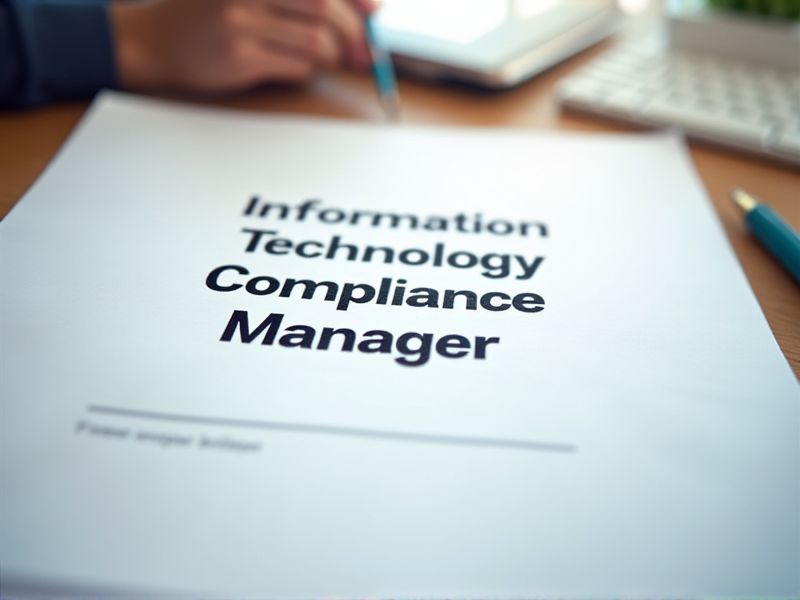
Information Technology Compliance Managers are responsible for ensuring that organizations adhere to legal regulations and industry standards related to IT systems. This role demands a deep understanding of both technology and compliance frameworks. Certifications serve to validate their expertise, demonstrating proficiency in critical areas like data protection, risk management, and IT governance. Here are some important certifications you may need in this field.
Certified Information Systems Auditor (CISA)
The Certified Information Systems Auditor (CISA) certification provides Information Technology Compliance Managers with a comprehensive understanding of auditing, control, and assurance practices. This certification equips them with the necessary skills to design and implement robust IT governance frameworks. Holding a CISA credential establishes credibility, ensuring stakeholders that the professional can effectively manage risk and align IT with business objectives. Compliance with international standards and regulations is achievable with informed strategies fostered by CISA expertise.
Certified Information Security Manager (CISM)
Certified Information Security Manager (CISM) provides the necessary knowledge to effectively design and manage an enterprise's information security program. Achieving CISM certification equips an IT Compliance Manager with advanced risk management skills, crucial for maintaining adherence to regulatory standards. The certification ensures understanding of governance processes, assisting in the alignment of security strategies with business objectives. CISM also enhances credibility and competency among peers and stakeholders, fostering trust in the IT compliance framework.
Certified in Risk and Information Systems Control (CRISC)
Earning the Certified in Risk and Information Systems Control (CRISC) enhances an Information Technology Compliance Manager's ability to effectively identify and manage IT risk. This certification focuses on aligning IT risk management with overall organizational risk strategies, which is crucial for ensuring compliance with industry standards. Possessing CRISC certification can lead to better communication with stakeholders by providing a standardized understanding of risk management processes. Employers often prefer IT Compliance Managers with CRISC credentials as it signifies a verified level of expertise in managing and mitigating IT risks.
Certified Information Privacy Professional (CIPP)
The role of an Information Technology Compliance Manager necessitates a comprehensive understanding of privacy laws and regulations, which the Certified Information Privacy Professional (CIPP) credential provides. This certification equips managers with the skills to navigate complex privacy frameworks, ensuring organizations adhere to legal standards. Having a CIPP credential demonstrates expertise in managing data protection, which is critical for maintaining compliance and avoiding potential legal penalties. As privacy regulations evolve, the CIPP credential helps compliance managers stay updated with current best practices and regulatory requirements.
Certified Information Systems Security Professional (CISSP)
Obtaining the CISSP certification for an Information Technology Compliance Manager enhances their credibility and knowledge in designing, implementing, and managing top-tier security programs. The certification equips managers with a deep understanding of security controls, enabling them to effectively assess and mitigate risks associated with compliance requirements. Insight from CISSP education ensures adherence to key standards and regulations, reducing the likelihood of security breaches and non-compliance penalties. Mastery of CISSP concepts allows the manager to align the organization's security framework with industry best practices, leading to improved overall security posture.
ISO/IEC 27001 Lead Auditor
An ISO/IEC 27001 Lead Auditor provides the necessary expertise to assess and ensure compliance with international information security standards. By identifying gaps in an organization's information security management system, they enable effective remediation and risk mitigation strategies. Their skills facilitate continuous improvement and maintain the trust of clients and stakeholders. As regulatory environments grow increasingly complex, their role supports adherence to legal and industry requirements.
ITIL Foundation Certification
Obtaining an ITIL Foundation Certification equips an Information Technology Compliance Manager with a structured approach to IT service management, ensuring alignment with established frameworks and standards. This certification enhances their ability to implement effective processes and improve service delivery, which leads to better compliance with industry regulations. Understanding ITIL practices allows the manager to streamline operations and reduce incidents of non-compliance. It also instills confidence in stakeholders by demonstrating a commitment to industry best practices.
CompTIA Security+
CompTIA Security+ certifies foundational cybersecurity skills, essential for IT compliance management. Without these skills, an IT Compliance Manager might struggle with evaluating and enhancing security protocols effectively, risking regulatory breaches. The certification ensures managers can identify vulnerabilities and threats that could lead to non-compliance. In a field where adherence to standards is critical, possessing Security+ credentials helps balance operational security with compliance mandates.
GIAC Security Essentials (GSEC)
The GIAC Security Essentials (GSEC) certification provides a fundamental understanding of information security, which is crucial for an IT Compliance Manager to ensure adherence to security standards. It covers essential security concepts, allowing compliance managers to better evaluate and implement security policies that align with regulatory requirements. The certification equips professionals with skills to identify vulnerabilities and respond to security incidents, aiding compliance with industry laws. GSEC certification ensures comprehensive knowledge of current security trends, helping managers maintain compliance with evolving legal mandates.
CompTIA Cybersecurity Analyst (CySA+)
CompTIA Cybersecurity Analyst (CySA+) certification equips IT compliance managers with skills to assess and manage threats effectively, which enhances their capability to enforce security protocols. It provides them with a comprehensive understanding of behavior analytics, improving their ability to predict and identify potential vulnerabilities in complex environments. The certification ensures the compliance manager is up-to-date with the latest defense techniques against evolving security threats. By being well-versed in threat detection and response, a compliance manager can ensure the organization's adherence to regulatory standards efficiently.
Summary
You, as an Information Technology Compliance Manager, can expect enhanced credibility and industry recognition after obtaining certifications. This often results in increased trust from stakeholders and colleagues. Companies may also value your certified expertise, leading to potential career advancements or salary increments. Access to updated industry standards and best practices becomes easier, ensuring compliance and reducing risks.
